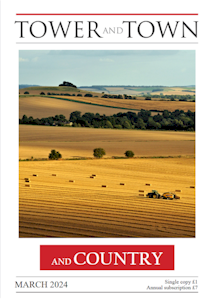

Tower and Town, March 2024 (view the full edition) (view the full edition)The River KennetThe Kennet is like an artery - a channelled lifeforce through our bit of Wiltshire. I met John Hounslow, a man who has spent more than 40 years tending to sections of the river, to find out more about this vital element of our local countryside. John is a fish-farmer and river-keeper for the stretch of the Kennet from Marlborough down to Axford. His role is the overall management of that river corridor for angling and for conservation generally. His work is principally general maintenance such as bridge-building, bank repair and tree-cutting, and although his focus is on the quality of the fishing, as he points out, the whole ecosystem of the river is essential to fish health, and vice versa. About 60% of the river that he looks after is fairly heavily managed, 20% only mildly so, and a further 20% left wild - these are the parts he enjoys the most and especially in May when every aspect of the river is bursting into life. Conservation of all the many diverse habitats along the river is so important to maintain and sustain that rich variety of flora and fauna that make it such a vital part of our local countryside. John says that the first ten years of his time working on the Kennet were the best because the river was in good health with an abundant population of wild fish, but increased human activity and development have put intolerable pressure on that environment, and water quality has declined significantly. This is largely the result of the failures of the sewerage infrastructure, agricultural and road run-off. During the last 35 years, for example, there has been a near fourfold increase in the discharge of treated sewage into the river, let alone those occasions of untreated discharge. John remembers well the chlorpyrifos pesticide contamination of 2013 and says that the river is only now recovering back to the state it was before then. That contamination destroyed the invertebrate population, which in turn did huge damage not only to the fish but also to all others in that ecosystem. He comments for example on the massive decline in swallows, swifts and house martins deprived of the insects necessary for their health and breeding. We all benefit from a rich and healthy river system in our midst, and need to be aware of the pressures that our existence and human activity put on that ecology. Housing developments, for example, add to the demand for water and increase the amount of effluent. If there is not sufficient investment in the infrastructure to support those developments, it is not only John's fish and his fishermen who suffer - we all do. David Du Croz |